unit1-grammar1
牛津译林七年级英语上册Unit1-Grammar-课件(共28张PPT)

2. They are classmates. _A__re_ they classmates? No, they a_r_e_n_’_t.
3. Eddie is Hobo’s master. __I_s__ Eddie Hobo’s master? No, it _is_n_’_t.
Activity 8: Make a conclusion
句型转换
1. His cousin is good at swimming.(改为否定句)
_H__i_s_c_o_u_s_i_n__is_n__’t__g_o_o_d__a_t_s_w__im__m__i_n_g_._
2. Those boys are from Beijing.(改为一般疑问句, 并做否定回答) —A—re—th—os—e b—oy—s f—ro—m—Be—ij—ing—? —No—, t—he—y a—re—n’—t.
Are they classmates?
肯定:Yes, they are. 否定:No, they aren’t.
在一般疑问句的肯定回 答中不能用缩写形式
变疑问,be提前,句末问号莫丢弃。
Fill in the blanks
1. It is a reading room. __Is__ it a reading room? Yes, it __is__.
am
高一英语Unit 1 grammar直接引语与间接引语-人教版[整理]
![高一英语Unit 1 grammar直接引语与间接引语-人教版[整理]](https://img.taocdn.com/s3/m/8c5ea96ea45177232f60a278.png)
Conclusion
1. 当主句的谓语动词是一般现在时的时候 2. 当主句的谓语动词是将来时的时候 3. 当直接引语部分带有具体的过去时间状 语时 4. 当直接引语中有以when, while引导的从 句,表示过去的时间时 5. 当直接引语是客观真理或自然现象时 6. 当引语是谚语、格言时 7. 当直接引语中有情态动词should, would, could, had better, would rather, might, must, ought to, used to, need时
Tom
said that they were listening to the pop music. Mother asked, “Have you finished your homework before you watch TV?” Mother asked me whether I had finished my homework before I watched TV.
Our teacher said to us, “Light travels faster than sound. ” Our teacher told us that light travels faster than sound. He said,“Practice makes perfect. ” He said that practice makes perfect. He said, “She must be a teacher. ” He said that she must be a teacher. The doctor said, “You'd better drink plenty of water. ” The doctor said I'd better drink plenty of water.
Unit 1-Grammar

consonant
begin beginning
change –ie to -y lie lying
double l
travel travelling
A Work in pairs. S1 is Bob and S2 is Ada. Ada is on holiday with friends. Bob is phoning her and asking her what all their friends are doing. Ada is telling him. Use the verbs in the box and the picture below to help you.
The Earth is flat. I don’t believe you.
You’re looking weird. I don’t understand.
What’s in that box? It doesn’t contain anything.
Is Tom going to win the race? I don’t think he can run fast enough.
Mary I __th__in_k__ that she _m__e_a_n_s_ ‘Be quiet!’ (think, mean)
Lynn Look! She ____is__s_m_i_li_n_g_____. (smile) Mary Yes, she ___s_m__il_e_s___ all the time.
Lynn The doorbell __i_s_r_in_g_i_n_g__. (ring) Sam I ____k_n_o_w____. I ____h_e_a_r____ it.
人教版高中英语必修一unit1grammar
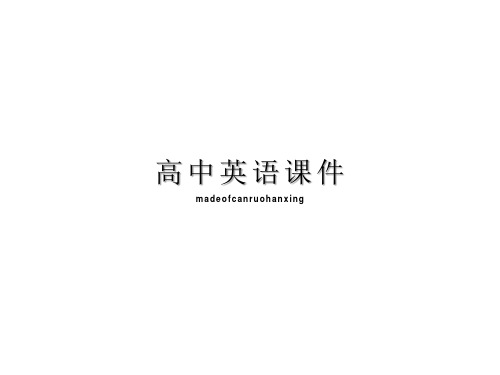
Whenyouchangeasentencefromdirects peechtoindirectspeech,yousometimes needtochangetheverbtense.Youmayal soneedtochangepronouns,timeinorder
tokeepthesamemeaning.
“Idon’tlikecomputers,”Sarahsaidtoherfriends.
Sarahsaidtoherfriends that Idon’tlike
computers. Sarah said
she
didn’t
Sarahsaidtoherfriendsthatshedidn’tlikecomput ers.
he
harvested Theyaskedhimwhenheharvestedthewheat.
选择疑问句
•用whether…or…表达,而不用if…or…,也 不用either…or… • Heasked,“DoyouspeakEnglishorFrench?”
• HeaskedmewhetherIspokeEnglishorFrenc h.
3.Tomsaid“Iwillseeyounextweek.” Tomsaidthathewouldseemethenextweek.
4.“Whywereyoulateagain?”Theteachersaidtome. TheteacheraskedmewhyIwaslateagain.
5.“Idon’tlikeswimming,”saidSarah. Sarahsaidshedidn’tlikeswimming.
一般疑问句
•间接引语用连词whether或if引导,原主句中 谓语动词said要改为asked(me/him/us等), 语序是陈述句的语序
高一英语必修一Unit1Grammar语法直接引语间接引语
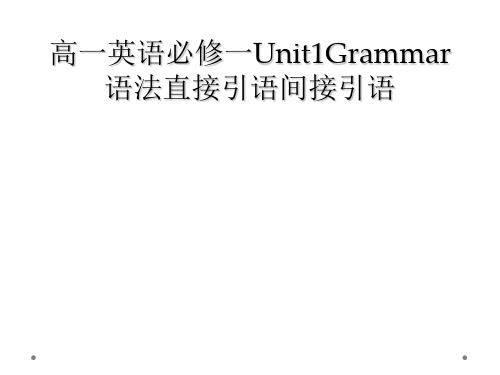
仍用一般现在时。例如: Teacher said to us:" The moon moves round
the earth." Teacher told us the moon moves round the earth. The teacher said to us : “Light travels faster
宾语从句
判断以下哪些句子属于间接引语
She said that she didn’t want to be a teacher. 间接 She said, “I don’t want to be a teacher〞.直接 He said, “ I like playing football〞. 直接 He said that he liked playing football. 间接
3. Mr Black said, “I have walked a long way this week.〞 Mr Black said that __ a long way __. A. I had walked…last week B. he had walked…that week C. I walked…last week D. he has walked…this week
〞 • 间接引语 Mum told me that I could clean my bedroom the next day . • Mr. Smith said,“He is a good worker. ’’ • Mr. Smith said that he was a good worker.
3.人称的变化
• 直接引语里的第一人称和第二人称,变间接引语时,人称要做相 应调整。例如:
必修一 Unit 1 Grammar-句子成分及基本句子结构
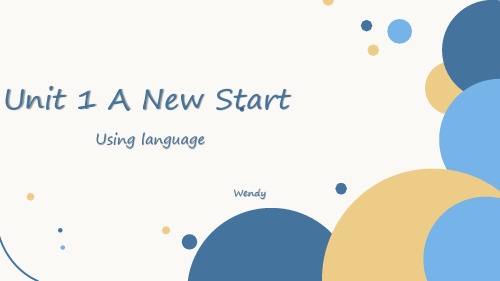
➢ e.g.
I will watch the movie.
He borrowed my key.
Time flies.
He can play basketball.
She quickly filled in the form.
句子成分
Unit 1 A new start Using language
句子成分
Unit 1 A new start Using language
表语或主语补足语 Subject complement
➢ 表语或主语补足语是接在联系动词(linking verb)之后的,用于补充说明主语所 处的状态的成分,一般由名词或形容词充当,整个句子构成所谓的“主系表”结构。 联系动词除了可以用be动词(am, is, are)构成之外,还可以用感官动词(smell, feel, taste…)充当。
c
4. I breathed deeply.
f
5. I looked at them in panic. g
6. I was embarrassed
a
7. His words made me a lot more relaxed! b
a He was friendly. b The exam made me quite nervous. c I passed him a book. d She agreed. e He wrote a long letter. f He talked loudly. g She looked after her sister patiently.
小试牛刀
造句练习
Unit 1 A new start Using language
译林版高一英语必修第一册(2019版)_Unit1_Grammar_同步练习
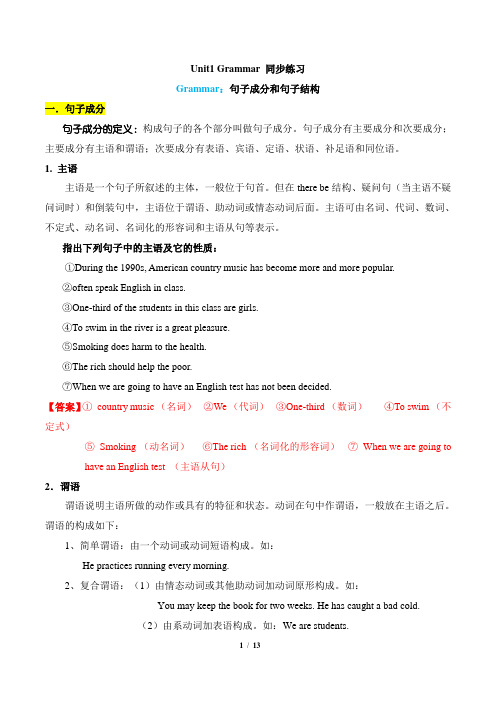
Unit1 Grammar 同步练习Grammar:句子成分和句子结构一.句子成分句子成分的定义:构成句子的各个部分叫做句子成分。
句子成分有主要成分和次要成分;主要成分有主语和谓语;次要成分有表语、宾语、定语、状语、补足语和同位语。
1. 主语主语是一个句子所叙述的主体,一般位于句首。
但在there be结构、疑问句(当主语不疑问词时)和倒装句中,主语位于谓语、助动词或情态动词后面。
主语可由名词、代词、数词、不定式、动名词、名词化的形容词和主语从句等表示。
指出下列句子中的主语及它的性质:①During the 1990s, American country music has become more and more popular.②often speak English in class.③One-third of the students in this class are girls.④To swim in the river is a great pleasure.⑤Smoking does harm to the health.⑥The rich should help the poor.⑦When we are going to have an English test has not been decided.【答案】①country music (名词)②We (代词)③One-third (数词)④To swim (不定式)⑤Smoking (动名词)⑥The rich (名词化的形容词)⑦When we are going tohave an English test (主语从句)2.谓语谓语说明主语所做的动作或具有的特征和状态。
动词在句中作谓语,一般放在主语之后。
谓语的构成如下:1、简单谓语:由一个动词或动词短语构成。
如:He practices running every morning.2、复合谓语:(1)由情态动词或其他助动词加动词原形构成。
Unit 1 Grammar 知识点讲解练习(解析版)
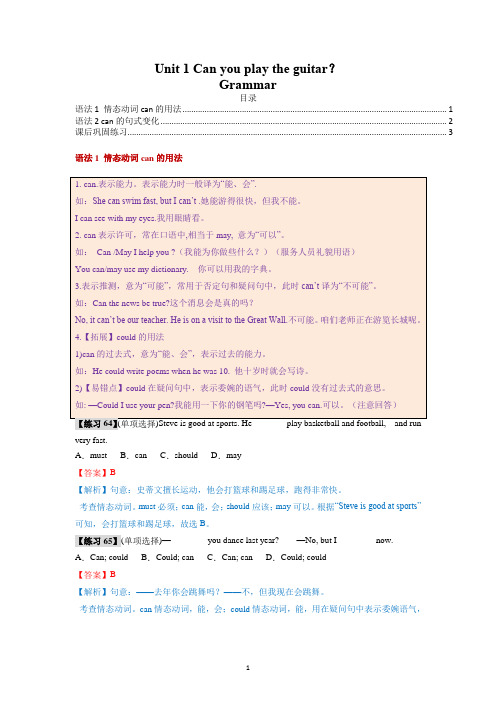
Unit 1 Can you play the guitar?Grammar目录语法1 情态动词can的用法 (1)语法2 can的句式变化 (2)课后巩固练习 (3)语法1 情态动词can的用法very fast.A.must B.can C.should D.may【答案】B【解析】句意:史蒂文擅长运动,他会打篮球和踢足球,跑得非常快。
考查情态动词。
must必须;can能,会;should应该;may可以。
根据“Steve is good at sports”可知,会打篮球和踢足球,故选B。
【练习65】(单项选择)—________ you dance last year? —No, but I ________ now.A.Can; could B.Could; can C.Can; can D.Could; could【答案】B【解析】句意:——去年你会跳舞吗?——不,但我现在会跳舞。
考查情态动词。
can情态动词,能,会;could情态动词,能,用在疑问句中表示委婉语气,也可表示过去的能力,第一空表示过去的能力用could,第二空是肯定句,有时间状语now 用can,故选B。
【练习66】(单项选择)Tom can’t play basketball on school days, but he ________ play it on weekends.A.must B.can C.have to D.should【答案】B【解析】句意:汤姆不能在上学的日子打篮球,但他可以在周末打。
考查情态动词。
must必须、一定;can可以、能够;have to不得不;should应该。
由转折词but可知,前后句之间表达的应是转折关系,前面说不能在上学的日子打篮球,则后面应该是说可以在周末打,因此can符合题意,故选B。
语法2 can的句式变化Bill ________ ________ the piano well.【答案】can play【解析】句意:比尔钢琴弹得很好。
- 1、下载文档前请自行甄别文档内容的完整性,平台不提供额外的编辑、内容补充、找答案等附加服务。
- 2、"仅部分预览"的文档,不可在线预览部分如存在完整性等问题,可反馈申请退款(可完整预览的文档不适用该条件!)。
- 3、如文档侵犯您的权益,请联系客服反馈,我们会尽快为您处理(人工客服工作时间:9:00-18:30)。
4. How____ you say that you really understand the whole story if you have covered only part of the article? A. A can B. must C. need D. may
5. There ____ be any difficulty about passing the road test since you have practised a lot in the driving school. A. mustn’t B. shan’t C. shouldn’t C D. needn’t
will和would:
1. will是助动词或是情态动词? will用于构成将来时是助动词。用于 表示“意志”“决心”“请求”是情态 动词。would亦同理。 eg. I will tell you something important. 我要告诉你一些重要的事。 (助动词)
Will you tell her that I'm here? 请您告诉她说我在这儿,好吗? (情态动词) 2. 在疑问句中用于第二人称,提出请 求或询问。 eg: If you want help - let me know, will you? 如果你需要帮助, 让我知道, 好吗?
may 和might : may 常用来表示: A. 表示请求、允许;比can较为正式: eg. May I come in ? You may go now. B. 表示说话人的猜测: “也许” “可
能”: 通常只用于肯定句和否定句中。
eg. --I believe the man is from England.
(表意愿) 我要和你一块到那儿去。 Teacher wouldn’t allow it. (表许可) 老师不会允许这件事。
shall和should:
1. shall用于构成将来时是助动词。 shall用于征求对方的意见,表示 “决心” 是情态动词。 eg: Perhaps I shall pay a visit to England this winter. 可能今年冬天我会去英国观光。 (构成一般将来时, 助动词)
2) could的主要用法是:
A. could 是can的过去式, 表示与过去
有关的能力和推测: eg. We all knew that the young man couldn’t be a doctor. B. could可以代替can表示请求, 但语 气较can客气、委婉:
eg. Could you lend me your dictionary? Could I use your bike? 3) can和could接动词的完成形式,表 示可能已经做某事。can用在否定和疑 问句中, 表示不相信、怀疑等态度。 eg. They can't have gone out because the light is still on.
6. A: The neighbour’ s children are older this year. _______________ Might or Should they stop playing tricks at Halloween? B: Perhaps, they __________ might stop ________________________. playing tricks at Halloween __________________________ or should stop playing tricks ____________. at Halloween
Grammar
can 和could: 1) can的主要用法是: A. 表示体力或脑力的能力: eg. The girl can dance very well. B. 表示说话的推测﹑事物的可能性等: eg. Can the news be true? C. 在口语中, can可以表示请求或允许: eg. Can I sit here?
3. A: _____ May I go with my friend to harvest festival? B: Yes, you _________________ may go ( with your ________. friends )
the
4. A: If I want to be a doctor should
除了在间接引语中以外,might 一般 不表示过去的可能或者许可。如要表示 过去的可能可以用could, 表示过去的许 可可以用was( were) allowed to 或者 had permission to 。
表示现在的可能,其可能性要比 may
小。如:
She might go home tomorrow. 说不定他明天会回家。 表示现在的许可,语气比may 较委婉, 一般用于疑问句(包括间接疑问句),不 可用于肯定句或者否定句。 如: Might I have a word with you? 我可以和你说句话吗?
1. ----____ I go out to play, mum? ----No, you___. You should do your homework first. A. Might; wouldn’t B. B May; had better not C. Must; mustn’t D. Need; mustn’t
_______ I study science? study science B: Yes, youshould __________________.
5. A: He is very handsome. Can ____ he play the role of the prince? B: No, he _______________________ can’t play the role of the ______. prince
表示推测,语气非常肯定,近乎 确定的意味,一般用在肯定句。 如:It must be eleven o’clock now. He must be crazy. 在表示推测的否定或者疑问句中 必须用 can, 不可以用 must。
If Mary didn’t leave here until five o’clock, she can’t be home yet. 如果玛丽五点才离开这儿,他此时一 定还未到家。
must 的主要用法:
1. 表示必然性。
eg: We must all die.
人总要死的。 2. 表示强制或者义务。 eg: You must get up early. 你必须早起来。
注意: must not 的意思是不许可,不应 该或者禁止。 如:We mustn’t waste our time. ---- May I take this magazine out? --- No, you mustn’t. must 用于一般疑问句的时候,肯定 回答应该用yes, please 或者 I’m afraid so, 其否定回答应该用 needn’t 或者 don’t have to。如:
--But I may be wrong. The guest may arrive this afternoon. 在肯定句中,may 的可能性比can 高,may 表示现实的可能性,can 表示 理论上的可能性。如:
The road may be blocked. 这条路可能不通了。 The road can be blocked. 这条路可能会是不通的。 在疑问句中,表示可能性用can。
Exercise
1. A: ______ Would you like to go to a special
event with us on Saturday? B: Yes, I ’d _____________________ like to go with you on _________. Saturday 2. A: ______ Could Xiao Feng find the origin of Easter from that book? B: No, he _____________. couldn’t find it
2. ---Where is Emma? ---I can’t say for sure where she is, but she___ be out shopping. A. can B. should C. must D. may D
3. The room is in a terrible mess; it ____ cleaned. A. A can’t have been B. couldn’t be C. may have been D. would be
如:Where can he be? 他会在哪呢?
C. 表示祝愿;但语气较正式: eg. May you succeed! May you have a good journey! might 的用法有: 多在间接引语中表示过去的可能和 允许。如: She said that he might take her bike. 她说他可以拿她的自行车去用。
Shall we go by train, Mom?
妈妈,我们乘火车去好吗?
(用于征求对方的意见,情态动词)
I shall go at once. 我必须立即去。 (表 “决心”,情态动词)
2. should表示义务、建议、劝告,意
为 “应该”。 “should+ have+过去分
词”
表示本应该在过去做但没有做。 eg: You should keep your promise. 你应该遵守诺言。 She should have passed the exam. 她应该通过考试的。
